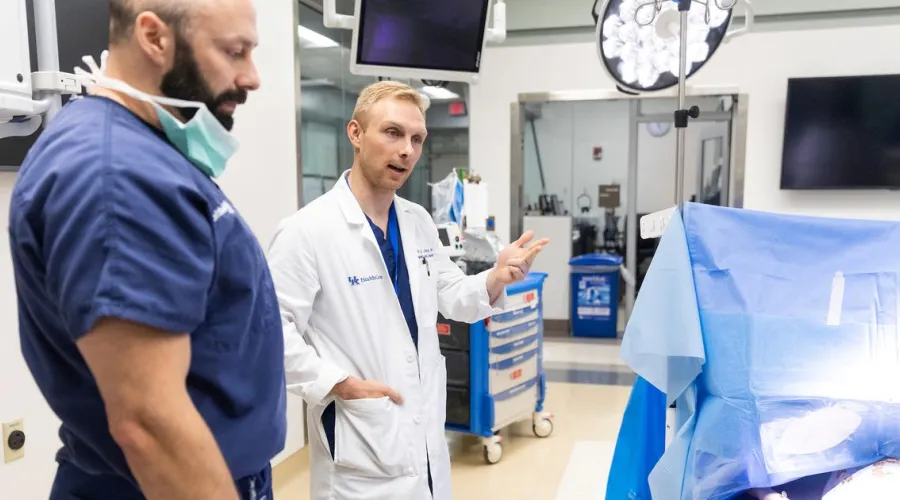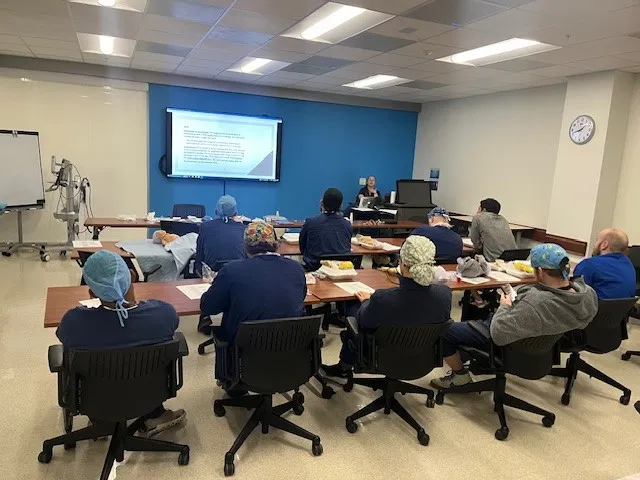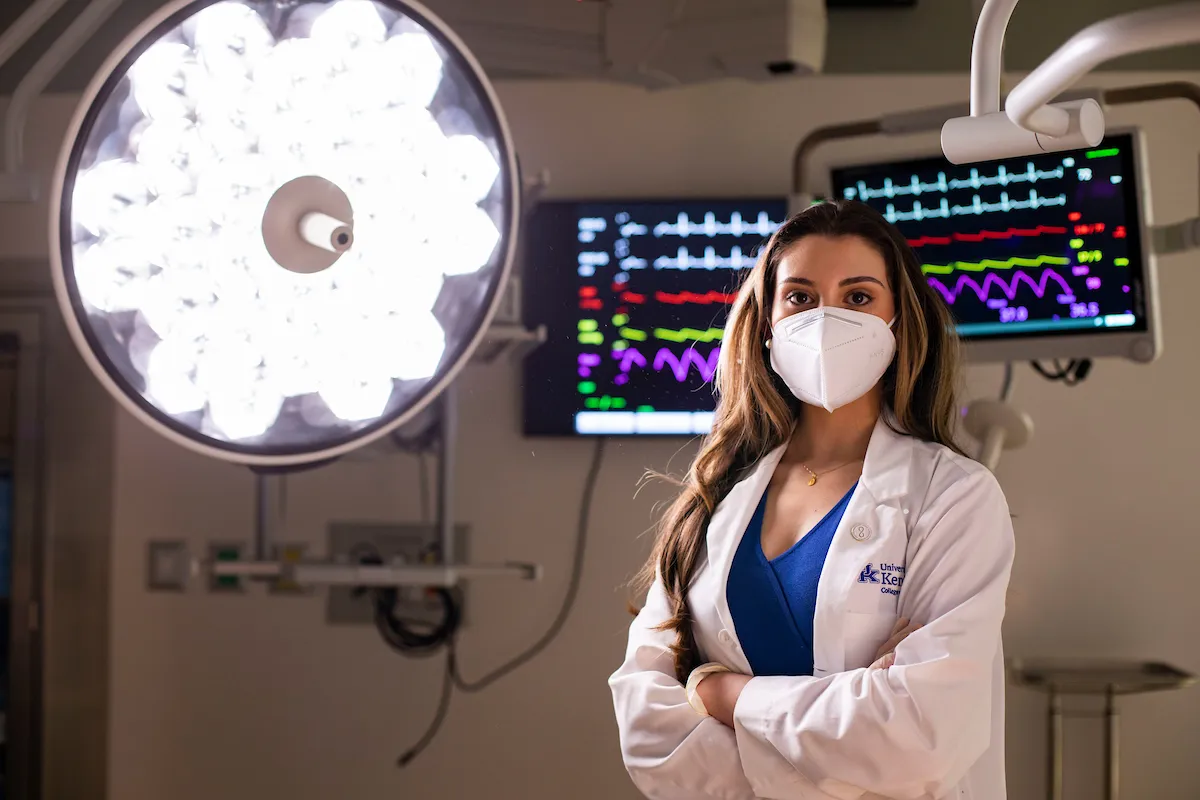
Residency Program
Application
Our educational program for anesthesiology residency training encompasses many different educational modalities as we prepare you to become board-certified in anesthesiology. It includes supervised patient care, formal conferences, board prep (OSCEs, orals, and basic/advanced), and simulation. Details of training requirements of the American Board of Anesthesiology (ABA) may be found in the ABA Booklet of Information, which is available on the ABA website here.
Curriculum
| PGY-1 | PGY-2 | PGY-3 | PGY-4 |
|---|---|---|---|
| CB/CA1 | CB/CA1 | CA2 | CA3 |
| Anesthesia (July) | Anesthesia (July) | CCM-3 | AC-CCM-4 |
| Chronic Pain - Clinical Base | Anesthesia | CTV-2(TEE) | AC-OB Anesthesia |
| CB (See table below) | Anesthesia | CTV-3 | AC-Peds/Shriners |
| CB (See table below) | Anesthesia | Transition to Practice - Good Samaritan | AC-CTV |
| CB (See table below) | Ambulatory | CB (See table below) | AC-Neuro |
| CB (See table below) | Pre-OP Clinic | Peds-Shriners | Elective |
| CB (See table below) | OB Anesthesia | Peds-UK | Elective |
| CB (See table below) | CTV-1 | OB Anesthesia | Elective |
| CB (See table below) | Neuroanesthesia | Regional | OR Supervisor |
| Acute Pain | CB (See table below) | PACU-POCUS | Transition to Practice - Good Samaritan |
| Anesthesia | CB (See table below) | Ambulatory | Transition to Practice - Good Samaritan |
| Anesthesia (April - June) | CB (See table below) | Remote Site | AC-Acute Pain |
Clinical Base
| PGY-1 | PGY-2 | PGY-3 | PGY-4 |
|---|---|---|---|
| CB/CA1 | CB/CA1 | CA2 | CA3 |
| . | |||
| Medicine | |||
| CCM-1 | |||
| PSH-1 (POC U/S) | |||
| Chronic Pain (inc. Palliative Care) | Cardiology Consults | ||
| Transfusion/PACU | |||
| Pediatric Surgery | |||
| Surgery | |||
| Pulmonary Consults | |||
| ED | |||
| PSH-2 Practice Mgmt (May) | |||
| CCM-2 |
- Clinical Base (CB) 12 months are indicated by the "CB-" prefix
- PGY-1, 2, and 4 Critical Care Medicine rotations are in the Cardiothoracic ICU
- PGY-3 Critical Care Medicine rotation is in the Neurosurgical ICU
- Three weeks of TEE training throughout CTV-2, CTV-3, and AC-CTV rotations
• AC (Advanced Clinical) rotations
- Supervisor rotation- experience teaching and supervising other residents and CRNAs
- Transition to Practice- experience modeling expected future practice including daily variety in case mix and assignments
- 3 months of PGY4 electives, including:
- Research - Research proposal will be approved by Dr. Pinault in advance. Experience in research available throughout training but usually accomplished during PGY4 year.
- Global Health/International Medicine: An elective of 1-2 weeks in international medicine is available to PGY4 residents (and PGY3 residents if acceptable to Dr. Montgomery and Dr. Pinault).
- Community-Based Medicine: Ambulatory surgery rotation based at Pikeville Medical Center in Pikeville, Ky.
- Veterans Affairs anesthesiology rotation - general OR rotation at the Lexington VAMC.
Getting Started
Your first month of anesthesia training is designed to prepare you to provide care to the healthy adult patient and to expose you to more specialized types of patients and techniques. The course includes time in the operating room, training in the human patient simulator, multiple didactic conferences each week, and the Anesthesia Knowledge Test at the beginning and end of the month. You will be supervised by an attending anesthesiologist and will be paired with another resident throughout the entire first month. This month is our opportunity to get to know each other and ensure you feel at home in our department before you go off to other services as part of the clinical base year. We hold multiple social gatherings to welcome you outside of the hospital as well.
At the beginning of your first month, you will be provided with the point-of-care ultrasound probe trainers and software, and a set of books that have been pre-selected by the program director. Barash's Clinical Anesthesia is used as the primary reference text.
Didactics
Both face-to-face conferences and online education are utilized. Face-to-face conferences emphasize interactive learning. UK videos are delivered via YouTube: click here.

| Monday | Tuesday | Wednesday | Thursday | Friday |
|---|---|---|---|---|
| Self-directed Learning | Core curriculum covering ABA content outline delivered by video cast with accompanying self-assessment questions. | General Competencies Conference (GCC). This conference is used to present interesting cases, management problems, morbidity and mortality, and professionalism vignettes. 6:30-7:30am | Cardiothoracic Anesthesia conference 7:00-8:00pm for residents rotating on cardiothoracic anesthesia. | A variety of conferences including task-based simulation, subspecialty, chief resident breakfast, and chair/program director breakfast. |
| Monthly Learning Lab. A half-day lab experience is provided monthly, with much of this content being provided in the Simulation Center, along with full hands-on learning experiences. This can be a variable day of the week. Additional opportunities for simulation are available throughout the year. | Lunch and Learn: an interactive conference including PBL case discussion and flipped classroom learning, offered at 11:00-11:50am and again at 12:00-12:50pm covering ABA keyword content. |
Journal Club
Journal Club is held quarterly and is meant to be a department-wide, multi-institutional experience to discuss the art of locating, interpreting, and applying research and identifying unanswered questions in clinical anesthesiology. Residents lead journal club presentations under the mentorship of Dr. Grant Avritt.
Journal Club
Journal Club is held quarterly and is meant to be a department-wide, multi-institutional experience to discuss the art of locating, interpreting, and applying research and identifying unanswered questions in clinical anesthesiology. Residents lead journal club presentations under the mentorship of Dr. Grant Avritt.
American Board of Anesthesiology Boards (In-Service Examination) Preparation
To prepare for the annual In-Training Exam, Lunch and Learn sessions between December and February focus on ITE keyword reviews. Preparation for the BASIC exam at the end of CA1 year includes weekly assigned multiple choice quizzes and review of board prep materials. Preparation for the APPLIED exam includes mock oral board examinations in large group and individual settings and mock OSCE exams. The Anesthesia Olympics are formative annual assessments by class year of resident performance in different scenarios and simulated procedures to assess milestone progression and prepare for future OSCE exams.
American Board of Anesthesiology Boards (In-Service Examination) Preparation
To prepare for the annual In-Training Exam, Lunch and Learn sessions between December and February focus on ITE keyword reviews. Preparation for the BASIC exam at the end of CA1 year includes weekly assigned multiple choice quizzes and review of board prep materials. Preparation for the APPLIED exam includes mock oral board examinations in large group and individual settings and mock OSCE exams. The Anesthesia Olympics are formative annual assessments by class year of resident performance in different scenarios and simulated procedures to assess milestone progression and prepare for future OSCE exams.
Anesthesia Simulator
Full high-fidelity human patient simulation (METI) is used in the first month of orientation and throughout residency training. In addition, multiple task simulators are utilized for skills training, and the Heartworks Simulator is used during TEE training. Each PGY1 is provided SonoSim Point of Care Ultrasound probe trainers and software. Additional opportunities for simulation are available throughout the year. Dr. Fain and Dr. Hume direct departmental simulation.
Anesthesia Simulator
Full high-fidelity human patient simulation (METI) is used in the first month of orientation and throughout residency training. In addition, multiple task simulators are utilized for skills training, and the Heartworks Simulator is used during TEE training. Each PGY1 is provided SonoSim Point of Care Ultrasound probe trainers and software. Additional opportunities for simulation are available throughout the year. Dr. Fain and Dr. Hume direct departmental simulation.
Visiting Professor Program
Each year nationally prominent anesthesiologists visit our department to enrich our educational program with lectures, leading journal club discussions, and observing in the OR. Guest lectures from UK faculty in other specialties are used to further supplement the didactic curricula.
Visiting Professor Program
Each year nationally prominent anesthesiologists visit our department to enrich our educational program with lectures, leading journal club discussions, and observing in the OR. Guest lectures from UK faculty in other specialties are used to further supplement the didactic curricula.
Practice Management Training
A series of lectures is provided covering such topics as operating room management, types of practice, job acquisition, financial planning, contract negotiations, billing arrangements, professional liability, and legislative and regulatory issues. PGY2 residents participate in a practice management rotation each May.
Practice Management Training
A series of lectures is provided covering such topics as operating room management, types of practice, job acquisition, financial planning, contract negotiations, billing arrangements, professional liability, and legislative and regulatory issues. PGY2 residents participate in a practice management rotation each May.
Case Counts
Graduated Clinical Anesthesia Assignments
Much of the learning and teaching of anesthesia occurs in the operating room. You will be assigned cases of increasing difficulty with time to help accomplish competency. Each resident is supervised by an attending anesthesiologist, who is responsible for supervising no more than two residents at a time. Cases are discussed with the attending ahead of time and a plan is generated. You are expected to read as necessary to be prepared for the case; the attending provides the supervision and teaching to ensure safe care for the patient and a good educational experience for the resident.
On subspecialty rotations, broader educational objectives and techniques are added. The program of graduated clinical assignments is designed to provide progressively challenging clinical problems, as well as an increasing degree of independence with the aim of graduating competent and confident practitioners in the entire spectrum of anesthesia care.
Case Experience
All residents exceed minimum standards and in most categories exceed 1.5-4 times the procedure requirements.


